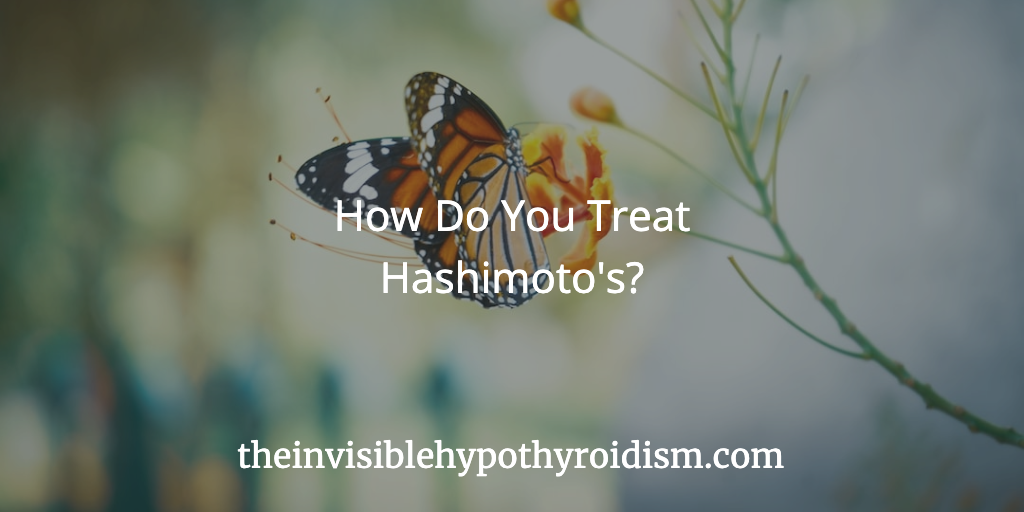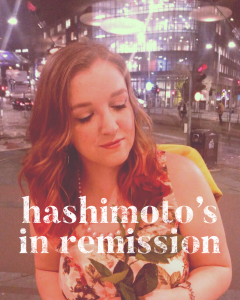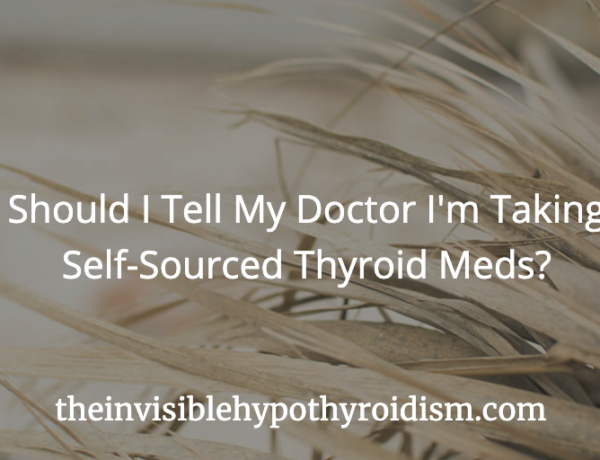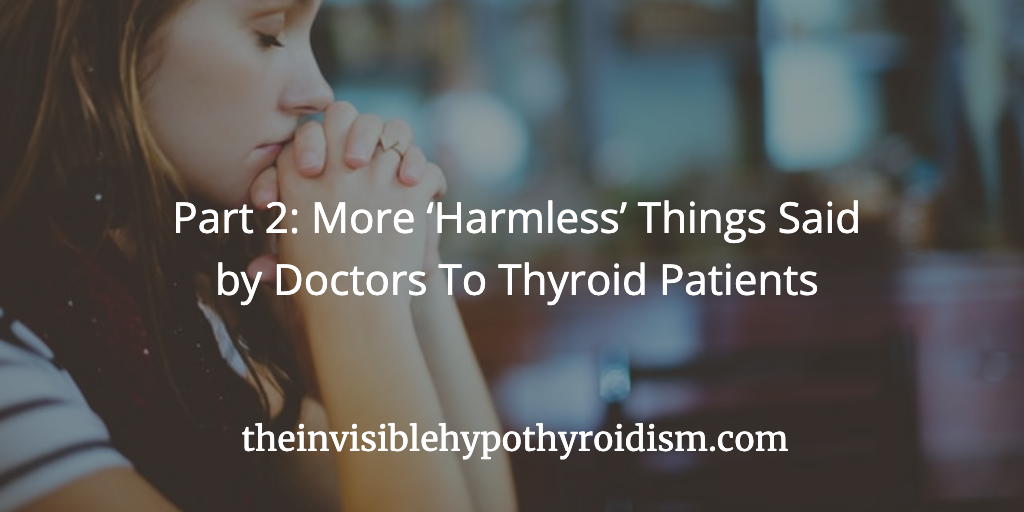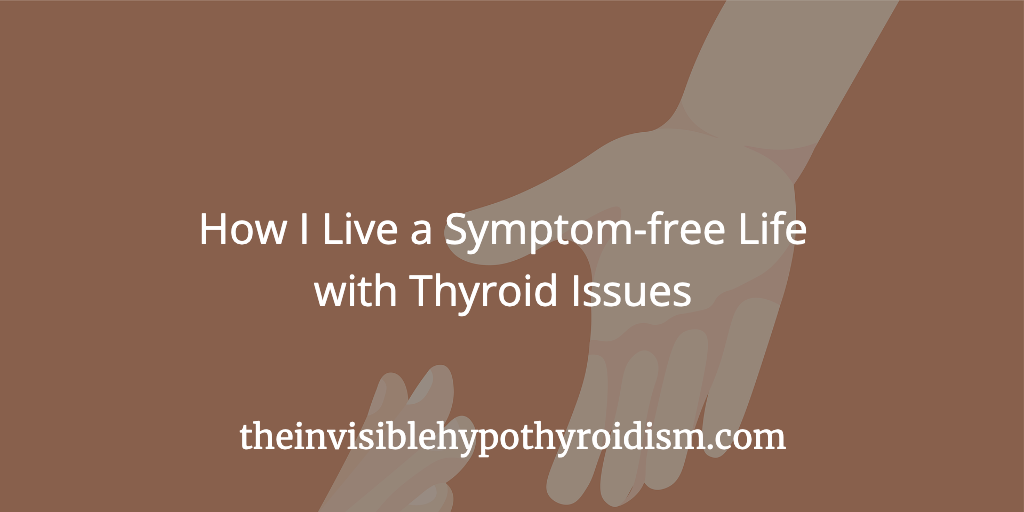Originally published on 12th May 2016 Last updated on 19th January 2024
Hashimoto’s is the most common cause of hypothyroidism.
This autoimmune disease, which causes the immune system to attack the thyroid gland, accounts for approximately 90% of all cases of Hypothyroidism. [1]
Those with Hashimoto’s tend to have the usual list of hypothyroid symptoms, as well as:
- Acid reflux
- Brain fog
- Gut complaints
- Nutrient deficiencies
- Anaemia / low iron
- Food sensitivities
- Adrenal dysfunction
and more.
In this post, I am going to explore the ways in which we can treat and manage Hashimoto’s and its symptoms. There is no cure for Hashimoto’s, but it can be put in to remission, which is defined by antibodies being within normal limits and the condition or symptoms stabilised and under better control.
Firstly, How Do You Know If You Have Hashimoto’s?
You can find out if you have Hashimoto’s by completing two blood tests: TPOAB and TGAB. If they are over the range, Hashimoto’s is diagnosed.
More info about what Hashimoto’s is can be found here.
If your doctor will not conduct these tests, you can order them yourself here (for the UK) and here (US link). Finding out if your hypothyroidism is caused by Hashimoto’s can be incredibly helpful when it comes to reducing symptoms and improving your quality of life with a thyroid condition.
Related Articles: What is the Difference Between Hypothyroidism and Hashimoto’s? and Why It’s Important to Know if You Have Hashimoto’s
What Do We Mean By ‘Treatment” For Hashimoto’s?
Treatment for Hashimoto’s typically aims to lower levels of the antibodies Thyroglobulin and Thyroid Peroxidase. Lowering them and keeping them as low as possible is often cited as defining a reduction of the severity of this autoimmune disease.
The word ‘remission’ is often used when treating Hashimoto’s. Putting Hashimoto’s in to remission is characterised by these thyroid antibodies either being at zero or within normal ranges. And this typically means that the Hashimoto’s is more well controlled and managed, as the attack and destruction of the thyroid gland is either halted or slowed down.
So, how do we put Hashimoto’s in to remission? How do we treat Hashimoto’s?
1. Going Gluten-free (and More?)
One theory we see a lot is that gluten apparently triggers the same autoimmune reactions that cause you to have Hashimoto’s in the first place, increasing inflammation, which can mean worse or extra symptoms. (However, this theory is yet to be conclusively proven.)
Read about the thyroid symptoms that disappeared for me after I went gluten-free.
However, other possible reasons for thyroid patients feeling better on a gluten-free diet include:
- that eating naturally gluten-free usually means a reduction in processed, high sugar foods overall
- that a gluten sensitivity can lead to poor gut health, which can be indicated by a low absorption rate of minerals and vitamins. For example, low levels of B12, D, Iron etc.
The Effect of Gluten-Free Diet on Thyroid Autoimmunity in Drug-Naive Women With Hashimoto’s Thyroiditis: A Pilot Study also concluded that their results suggested a gluten-free diet may bring clinical benefits to women with Hashimoto’s. [2]
If you think you could be sensitive to gluten, or are just interested in giving gluten-free a try to see if it helps your fatigue, aches and pains, etc. may try eliminating it from your diet for at least 3-4 months and keep a log of how you feel (you could also retest your antibodies, TPOAB and TGAB, to see if they come down. You can order these tests online here and here).
However, there are huge benefits in screening for coeliac disease before removing gluten. For example, diagnostic tests for coeliac disease require you to be on a gluten-containing diet so that the test can detect any antibodies to gluten. If you are already on a gluten-free diet when tested for coeliac disease, you will need to reintroduce gluten for several weeks before the blood test, in order to get accurate results. Having a formal diagnosis of coeliac disease, if you have it, is also important.
Also, if coeliac disease is confirmed, as well as lifelong, strict gluten-free diet a longterm treatment plan will also need creating by your doctor and dietician to ensure you’re still getting the right nutrients from other foods. Monitoring of any intestinal damage and healing, as well as vitamin or mineral deficiencies is also recommended.
In addition to a gluten sensitivity, you may also be sensitive to other proteins including grains such as rice, quinoa, and corn. Others may react badly to dairy, soy, nightshades and eggs, with Hashimoto’s.
You may wish to trial going completely free of any possible offending foods for a few weeks to check if you do indeed have a sensitivity to them. See if you notice any difference in how you feel, or an increase in any symptoms after consuming them. It could be hours or a day later, but does it make you feel extra tired or give you acid reflux? Keep a food diary and try an Elimination Provocation Diet (EPD).
The idea of the EPD is to initially remove all and any foods which may be making your thyroid health worse, before adding them back in one by one and looking for noticeable responses to these foods. Those wanting to try the EPD are generally advised to remove all potentially inflammatory foods from their diet for three weeks, which include:
- Gluten
- Dairy
- Corn
- Eggs
- Nightshades
- Nuts
- Legumes
- Shellfish
- Citrus
- Soy
After three weeks, the reintroduction of each food type can slowly begin. On a ‘reintroduction day’ you would choose one food type to reintroduce to your diet, eating around five servings in one day whilst monitoring symptoms over the next few days to determine if it needs to stay out of your diet for good.
Symptoms of a food sensitivity may include fatigue, heartburn, indigestion, bloating, gas, muscle aches and pains, joint pain, skin issues, brain fog etc. but can be individual to you. Foods can then continue to be added one at a time every few days and further signs for issues with these foods recorded.
And an important note: as someone who personally has a history of eating disorders / disordered eating myself, I am aware that the information in this article could be triggering if you’ve previously / are currently restricting foods. Do know that I will never suggest that any of us HAVE to cut out ANY food types, so I present this info for each of us to make that decision ourselves if we still have ongoing thyroid symptoms or struggles to manage the condition.
Some people may begin removing one or two foods from their diet and enter down a slippery slope in to disordered eating behaviours, so if this is you, and you start to feel anxious about food or much of your time and energy is preoccupied with this, please seek out support from a trained professional and be cautious about altering your diet. Disordered eating needs to be taken more seriously and I don’t wish to contribute to more people struggling with this.
I’m not a fan of massively restrictive diets which can encourage disordered eating behaviours, and thus, create more stress which, in turn, isn’t great for our health either.
2. Improving Gut Health
Hippocrates said: “All disease begins in the gut”
Your gut is home to your immune system, so when you heal and balance your gut function, it can improve your immune function too. Stress and an imbalance of gut flora can lead to poor gut health. I have experience with Candida (yeast overgrowth). Addressing this played a big part in getting my health back from Hashimoto’s.
A UK test for Candida can be found here and a US test here.
3. Considering Supplements
As having Hashimoto’s means having possible damage to your gut lining, loss of absorption from vitamins and minerals can also occur. Because of this, there are many that you may wish to supplement. These include B12, D (always take with Vitamin K), Selenium, C, zinc, iron etc. Probiotics and Prebiotics are often recommended to help maintain a healthy gut, as are magnesium and zinc. L-Tyrosine is sometimes also used.
Supplementing selenium [3] has also been shown to help lower thyroid antibodies, as has Vitamin D. [4]
Read more on supplements here.
4. Considering Infections
It is also be worth checking for infections anywhere in the body from the mouth to the gut, and treating them appropriately. From mouth ulcers to tooth infections and H Pylori, they can all affect gut health and overall health and wellbeing.
5. Optimising Thyroid Hormone Levels
Make sure you’re on the right thyroid medication for you, and that your levels are optimal
To get your levels right, you may need to switch medication type (with the guidance of a doctor, obviously). A lot of patients have low Free T3 levels when on T4-only medication like Levothyroxine or Synthroid, as they fail to convert it to active T3. So they may do better when adding in T3 to their T4, switching to T3 altogether, or switching to natural desiccated thyroid. It’s about finding what works best for you. We’re all different. You should work with your doctor to do this.
6. Checking Adrenals
It’s not only crucial to make sure your thyroid levels are right, but also your cortisol levels.
Having high or low cortisol can wreak havoc and cause a lot of similar symptoms to hypothyroidism. Read more here.
You can do a 24-hour saliva cortisol test, testing 4 key points throughout the day, to test your adrenal function. Once you know if you have highs, lows or a mix, you can work on addressing it, and in turn, getting rid of some of those other pesky symptoms.
We address it by assessing sleep habits, exercise habits, diet and other lifestyle factors, including everything that contributes to stress.
If your doctor won’t check your adrenals, you can very simply order testing yourself from here or here.
The adrenal glands are part of the endocrine system, just like the thyroid, so they work together. You need to look after both. After all, the body relies on both of them to do so much.
7. Optimising Blood Sugar
Blood sugar imbalances are also common for those who have Hashimoto’s. If you feel a low blood sugar moment, eat protein and healthy fats, not more carbs or sugar.
Learn to eat in a way that keeps your blood sugar levels balanced. Read more here.
8. Checking Sex Hormones
Many practitioners in the holistic medicine world also propose that many of us have something called oestrogen dominance.
9. LDN
Due to Hashimoto’s being an autoimmune disease, LDN can be beneficial for those with Hashimoto’s by reducing high antibodies, stopping the progression of the autoimmune disease or even reversing the disease. Besides improving endorphin production, LDN can also help reduce inflammation and encourage healing.
10. Learning About The Spoon Theory
The spoon theory is a metaphor those with a disability, chronic illness, health condition and/or autoimmune disease (such as hypothyroidism or Hashimoto’s), can use to explain their reduced amount of energy and how they manage their energy levels effectively.
Whereas people with no ongoing health issues do not need to worry about running out of energy, many of us with thyroid issues do, so learning how to manage our energy use wisely can be a huge game changer.
We can be more at risk of over-exhausting and expecting too much of ourselves, compared to others, so it’s important to rediscover your energy levels and expectations. Read about the spoon theory here.
Managing Hashimoto’s effectively includes knowing how to avoid repeatedly doing too much.
***
Read about how I specifically got my Hashimoto’s in to remission here.
What have you found to help manage your Hashimoto’s?
You can click on the hyperlinks in the above post to learn more and see references to information given.
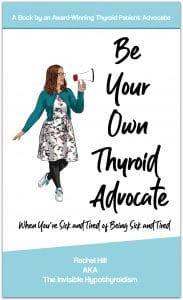
The book Be Your Own Thyroid Advocate: When You’re Sick and Tired of Being Sick and Tired, which builds on this article in detail. It recounts how I got my own Hashimoto’s in remission and under control.
References:
[1] https://www.ncbi.nlm.nih.gov/pubmed/3066320
[2] https://www.thieme-connect.de/products/ejournals/pdf/10.1055/a-0653-7108.pdf
[3] https://www.ncbi.nlm.nih.gov/pubmed/11932302
[4] https://www.ncbi.nlm.nih.gov/pubmed/27186560

